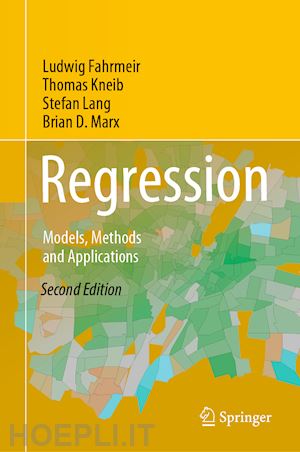
Questo prodotto usufruisce delle SPEDIZIONI GRATIS
selezionando l'opzione Corriere Veloce in fase di ordine.
Pagabile anche con Carta della cultura giovani e del merito, 18App Bonus Cultura e Carta del Docente
Now in its second edition, this textbook provides an applied and unified introduction to parametric, nonparametric and semiparametric regression that closes the gap between theory and application. The most important models and methods in regression are presented on a solid formal basis, and their appropriate application is shown through numerous examples and case studies. The most important definitions and statements are concisely summarized in boxes, and the underlying data sets and code are available online on the book’s dedicated website. Availability of (user-friendly) software has been a major criterion for the methods selected and presented.
The chapters address the classical linear model and its extensions, generalized linear models, categorical regression models, mixed models, nonparametric regression, structured additive regression, quantile regression and distributional regression models. Two appendices describe the required matrix algebra, as well as elements of probability calculus and statistical inference.
The book primarily targets an audience that includes students, teachers and practitioners in social, economic, and life sciences, as well as students and teachers in statistics programs, and mathematicians and computer scientists with interests in statistical modeling and data analysis. It is written at an intermediate mathematical level and assumes only knowledge of basic probability, calculus, matrix algebra and statistics.
Introduction.- Regression Models.- The Classical Linear Model.- Extensions of the Classical Linear Model.- Generalized Linear Models.- Categorical Regression Models.- Mixed Models.- Nonparametric Regression.- Structured Additive Regression.- Distributional Regression Models.
Ludwig Fahrmeir is Professor Emeritus at the Institute of Statistics at LMU Munich, Germany. From 1995 to 2006 he was the speaker of the Collaborative Research Center 'Statistical Analysis of Discrete Structures', supported financially by the German National Science Foundation. His main research interests include semiparametric regression, longitudinal data analysis and spatial statistics, with applications ranging from social science and risk management to public health and neuroscience.
Thomas Kneib is a Professor of Statistics at the University of Göttingen, Germany, where he is the Speaker of the interdisciplinary Centre for Statistics and Vice-Speaker of the Campus Institute Data Science. He received his PhD in Statistics at LMU Munich and, during his PostDoc phase, was Visiting Professor of Applied Statistics at the University of Ulm and Substitute Professor of Statistics at the University of Göttingen. From 2009 until 2011 he was Professor of Applied Statistics at Carl von Ossietzky University Oldenburg. His main research interests include semiparametric regression, spatial statistics and distributional regression.
Stefan Lang is a Professor of Applied Statistics at the University of Innsbruck, Austria. He received his PhD at LMU Munich. From 2005 to 2006 he was Professor of Statistics at the University of Leipzig. He is currently Associate Editor of the journal Statistical Modelling. His main research interests include semiparametric and spatial regression, multilevel modelling and complex Bayesian models, with applications, among others, in development economics, environmetrics, marketing science, real estate and actuarial science.
Brian D. Marx was Professor at the Department of Experimental Statistics at Louisiana State University, LA, USA. He passed away shortly after the authors finished the work on this 2nd edition. His main research interests included P-spline smoothing, ill-conditioned regression problems, and high-dimensional chemometric applications. He was serving as Coordinating Editor for the journal Statistical Modelling for many years, was Chair of the Statistical Modelling Society, and a Fellow of the American Statistical Association.











Il sito utilizza cookie ed altri strumenti di tracciamento che raccolgono informazioni dal dispositivo dell’utente. Oltre ai cookie tecnici ed analitici aggregati, strettamente necessari per il funzionamento di questo sito web, previo consenso dell’utente possono essere installati cookie di profilazione e marketing e cookie dei social media. Cliccando su “Accetto tutti i cookie” saranno attivate tutte le categorie di cookie. Per accettare solo deterninate categorie di cookie, cliccare invece su “Impostazioni cookie”. Chiudendo il banner o continuando a navigare saranno installati solo cookie tecnici. Per maggiori dettagli, consultare la Cookie Policy.